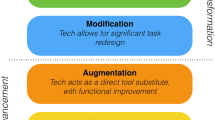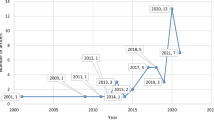Abstract
The purpose of this study was to investigate the views of preservice teachers from Turkey and Sweden about twenty-first century skills. The participants of the study were 197 preservice teachers from universities in Turkey and Sweden. In the study, the views of preservice teachers about twenty-first century skills were investigated with an open-ended questionnaire, and the collected qualitative data were analysed using a content analysis method. The findings indicate that within the context of daily life, the preservice teachers from both countries associated twenty-first century skills mostly with technology, digital citizenship, communication, and information literacy. Within the context of education, a great majority of the preservice teachers from Turkey associated twenty-first century skills with information literacy and technology, while those from Sweden associated twenty-first century skills mostly with technology, distance learning and communication. In addition, it was seen that among the skills considered by the preservice teachers from both countries to be necessary for their careers and for their future students, they all put most emphasis on digital literacy. However, as the second most frequent skills, the preservice teachers from Turkey emphasized critical thinking and problem solving skills, while the preservice teachers from Sweden mentioned communication skills and information literacy.
Similar content being viewed by others
References
Ananiadou, K., & Claro, M. (2009) 21st century skills and competences for new millennium learners in OECD countries. OECD Education Working Paper, No. 41. http://repositorio.minedu.gob.pe/handle/123456789/2529. Accessed 14 June 2019.
Baştürk, S. (2012). Sınıf öğretmenlerinin öğrencilerin matematik dersindeki başarı ya da başarısızlığına atfettikleri nedenler. Mehmet Akif Ersoy Üniversitesi Sosyal Bilimler Enstitüsü Dergisi, 4(7), 105–118.
Binkley, M., Erstad, O., Herman, J., Raizen, S., Ripley, M., Miller-Ricci, M., et al. (2012). Defining twenty-first century skills. In P. Griffin, B. McGaw, & E. Care (Eds.), Assessment and teaching of 21st century skills: Methods and approach (pp. 17–66). Dordrecht: Springer.
Büyüköztürk, Ş., Kılıç-Çakmak, E., Akgün, Ö. E., Karadeniz, Ş., & Demirel, F. (2012). Bilimsel araştırma yöntemleri (11th ed.). Ankara: Pegem A Yayıncılık.
Caruso, J. B., & Kvavik, R. (2005). ECAR study of students and information technology 2005: Convenience, connection, control, and learning, EDUCAUSE. http://connect.educause.edu/Library/ECAR/ECARStudyofStudentsandInf/41159. Accessed 14 June 2019.
Christensen, R., & Knezek, G. (2008). Self-report measures and findings for information technology attitudes and competencies. In J. Voogt & G. Knezek (Eds.), International handbook of information technology in primary and secondary education (pp. 349–365). New York: Springer.
Crowe, A. (2004). Teaching by example: Integrating technology into social studies education courses. Journal of Computing in Teacher Education, 20(4), 159–165.
Dede, C. (2000). Emerging influences of information technology on the school curriculum. Journal of Curriculum Studies, 32(2), 281–303.
Dede, C. (2005). Planning for neomillennial learning styles: Implications for investments in faculty and technology. In D. Oblinger & J. Oblinger (Eds.), Educating the net generation (pp. 15.1–15.22). Boulder: EDUCAUSE. http://www.educause.edu/educatingthenetgen. Accessed 28 December 2019.
Dede, C. (2010). Comparing frameworks for 21st century skills. In Bellanca J. & Brandt R. (Eds.), 21st century skills (pp. 51–76). Bloomington: Solution Tree Press.
Dinçer, S. (2018). Are preservice teachers really literate enough to integrate technology in their classroom practice? Determining the technology literacy level of preservice teachers. Education and Information Technologies, 23(6), 2699–2718.
Ertmer, P. A. (1999). Addressing first and second order barriers to change: Strategies for technology integration. Educational Technology Research and Development, 47(4), 47–61.
Ertmer, P. A., Ottenbreit-Leftwich, A. T., Sadik, O., Sendurur, E., & Sendurur, P. (2012). Teacher beliefs and technology integration practices: A critical relationship. Computers & Education, 59, 423–435.
European Commission (2007). Key competences for lifelong learning: A European reference framework. Brussels: European Communities.
Ghavifekr, S., & Wan Athirah, W. R. (2015). Teaching and learning with technology: Effectiveness of ICT integration in schools. International Journal of Research in Education and Science, 1(2), 175–191.
Gordon, J., Halasz, G., Krawczyk, M., Leney, T., Michel, A., Pepper, D. et al, (2009). Key competences in Europe. Opening doors for lifelong learners across the school curriculum and teacher education. Warsaw: Case-Center for Social and Economic Research.
Gudmundsdottir, G. B., & Hatlevik, O. E. (2018). Newly qualified teachers’ professional digital competence: Implications for teacher education. European Journal of Teacher Education, 41(2), 214–231.
Günüç S., Odabaşı H.F., & Kuzu A. (2013). 21. yüzyıl öğrenci özelliklerinin öğretmen adayları tarafından tanımlanması: Bir Twitter uygulaması, Eğitimde Kuram ve Uygulama, 9(4), 436–455.
Häkkinen, P., Järvelä, S., Mäkitalo-Siegl, K., Ahonen, A., Näykki, P., & Valtonen, T. (2017). Preparing teacher-students for twenty-first-century learning practices (PREP 21): A framework for enhancing collaborative problem-solving and strategic learning skills. Teachers and Teaching, 23(1), 25–41.
Hew, K., & Brush, T. (2007). Integrating technology into K-12 teaching and learning: Current knowledge gaps and recommendations for future research. Educational Technology Research and Development, 55(3), 223–252.
Inan, F. A., & Lowther, D. L. (2010). Laptops in the K-12 classrooms: Exploring factors impacting instructional use. Computers & Education, 55(3), 937–944.
International Society for Technology in Education [ISTE] (2007). The ISTE National Education Technology Standards and performance indicators for students. https://www.iste.org/. Accessed 15 June 2019.
International Society for Technology in Education ISTE (2008). The ISTE National Educational Technology Standards and performance indicators for teachers (NETS-T). https://www.iste.org/. Accessed 15 June 2019.
Kaya, Y. (2010). Sosyal bilgiler eğitimindeki sorunlar ve çözüm önerileri: öğretim elemanlarının görüşleri. Türk Eğitim Bilimleri Dergisi, 8(4), 839–867.
Kirschner, P., Wubbels, T., & Brekelmans, M. (2009). Benchmarks for teacher education programs in the pedagogical use of ICT. In J. Voogt & G. Knezek (Eds.), International handbook of information technology in primary and secondary education (pp. 435–447). New York: Springer.
Kopcha, T. J. (2012). Teachers’ perceptions of the barriers to technology integration and practices with technology under situated professional development. Computers & Education, 59(4), 1109–1121.
Kumar, S., & Vigil, K. (2011). The net generation as pre-service teachers: Transferring familiarity with new technologies to educational environments. Journal of Digital Learning in Teacher Education, 27(4), 144–151.
Lambert, J., & Cuper, P. (2009). Multimedia technologies and familiar spaces: 21st century teaching for 21st century learners. Contemporary Issues in Technology & Teacher Education, 8(3), 264–276.
Lambert, J., & Gong, Y. (2010). 21st century paradigms for pre-service teacher technology preparation. Computers in the Schools, 27, 54–70.
Larson, L. C., & Miller, T. N. (2011). 21st century skills: Prepare students for the future. Kappa Delta Pi Record, 47(3), 121–123.
Lei, J. (2009). Digital natives as preservice teachers: What technology preparation is needed? Journal of Computing in Teacher Education, 25(3), 87–97.
Ministry of National Education (MEB). (2012). Fatih Project. http://fatihprojesi.meb.gov.tr. Accessed 18 June 2019.
Morvan, C. (2014). Developing pupil competences through eTwinning. Brussels: European Schoolnet.
O’Neal, L. J., Gibson, P., & Cotten, S. R. (2017). Elementary school teachers’ beliefs about the role of technology in 21st-century teaching and learning. Computers in the Schools, 34(3), 192–206.
Organisation for Economic Co-operation and Development [OECD] (2004). Lifelong learning. http://www.oecd.org/dataoecd/17/11/29478789.pdf. Accessed 30 June 2005.
Ottenbreit-Leftwich, A., Glazewski, K., Newby, T., & Ertmer, P. (2010). Teacher value beliefs associated with using technology: Addressing professional and student needs. Computers & Education, 55, 1321–1335.
P21 (2019). Framework for 21st century learning. Partnership for 21st century learning a network of battelle for kids. http://static.battelleforkids.org/documents/p21/P21_Framework_Brief.pdf. Accessed 15 June 2019.
Prensky, M. (2006). Don’t bother me mom—I’m learning! St. Paul: Paragon House.
Sağlam, A. Ç., & Büyükuysal, E. (2013). Eğitim fakültesi son sınıf öğrencilerinin eleştirel düşünme düzeyleri ve buna yönelik engellere ilişkin görüşleri. International Journal of Human Sciences, 10(1), 258–278.
Schooner, P., Nordlöf, C., Klasander, C., & Hallström, J. (2016). Developing 21st century skills in Swedish compulsory school technology education: Three teacher perspectives. In PATT 32 Proceedings: Technology Education for 21st Century Skills (pp. 411–418). Utrecht. http://urn.kb.se/resolve?urn=urn:nbn:se:liu:diva-132974. Accessed 20 June 2019.
Teo, T., & Tan, L. (2012). The theory of planned behavior (TPB) and pre-service teachers' technology acceptance: A validation study using structural equation modeling. Journal of Technology and Teacher Education, 20(1), 89–104.
The Swedish National Agency for Education. (2011). Curriculum for the compulsory school, preschool class and the recreation Centre 2011. Stockholm: The Swedish National Agency of Education.
Tondeur, J., van Keer, H., van Braak, J., & Valcke, M. (2008). ICT integration in the classroom: Challenging the potential of a school policy. Computers & Education, 51, 212–223.
Tondeur, J., Aesaert, K., van Braak, J., Pynoo, B., Freyman, N., & Erstadt, O. (2017a). Developing a validated instrument to measure pre-service teachers' ICT competencies: Meeting the demands of the 21st-century. British Journal of Educational Technology, 48(2), 462–472.
Tondeur, J., van Braak, J., Ertmer, P. A., & Ottenbreit-Leftwich, A. (2017b). Understanding the relationship between teachers' pedagogical beliefs and technology use in education: A systematic review of qualitative evidence. Educational Technology Research and Development, 65(3), 555–575.
Tümkaya, S. (2011). Fen bilimleri öğrencilerinin eleştirel düşünme eğilimleri ve öğrenme stillerinin incelenmesi. Ahi Evran Üniversitesi Eğitim Fakültesi Dergisi, 12(3), 215–234.
Uluyol, Ç., & Eryılmaz, S. (2015). 21. yüzyıl becerileri işığında fatih projesi değerlendirmesi. Gazi Üniversitesi, Gazi Eğitim Fakültesi Dergisi, 35(2), 209–229.
Valtonen, T., Sointu, E. T., Kukkonen, J., Häkkinen, P., Järvelä, S., Ahonen, A., et al. (2017). Insights into Finnish first-year pre-service teachers’ perceptions of their 21st century skills. Education and Information Technologies, 22(5), 2055–2069.
Van Laar, E., Van Deursen, A. J. A. M., Van Dijk, J. A. G. M., & De Haan, J. (2017). The relation between 21st-century skills and digital skills: A systematic literature review. Computers in Human Behavior, 72, 577–588.
Voogt, J., & Roblin, N. P. (2012). A comparative analysis of international frameworks for 21st century competences: Implications for national curriculum policies. Journal of Curriculum Studies, 44(3), 299–321.
Voogt, J., Erstad, O., Dede, C., & Mishra, P. (2013). Challenges to learning and schooling in the digital networked world of the twenty-first century. Journal of Computer Assisted Learning, 29, 403–413.
Wachira, P., & Keengwe, J. (2011). Technology integration barriers: Urban school mathematics teachers’ perspectives. Journal of Science Education and Technology, 20, 17–25.
Yıldırım, A., & Şimşek, H. (2011). Sosyal bilimlerde nitel araştırma yöntemleri. Ankara: Seçkin yayıncılık.
Author information
Authors and Affiliations
Corresponding author
Additional information
Publisher’s note
Springer Nature remains neutral with regard to jurisdictional claims in published maps and institutional affiliations.
Rights and permissions
About this article
Cite this article
Karakoyun, F., Lindberg, O.J. Preservice teachers’ views about the twenty-first century skills: A qualitative survey study in Turkey and Sweden. Educ Inf Technol 25, 2353–2369 (2020). https://doi.org/10.1007/s10639-020-10148-w
Received:
Accepted:
Published:
Issue Date:
DOI: https://doi.org/10.1007/s10639-020-10148-w




